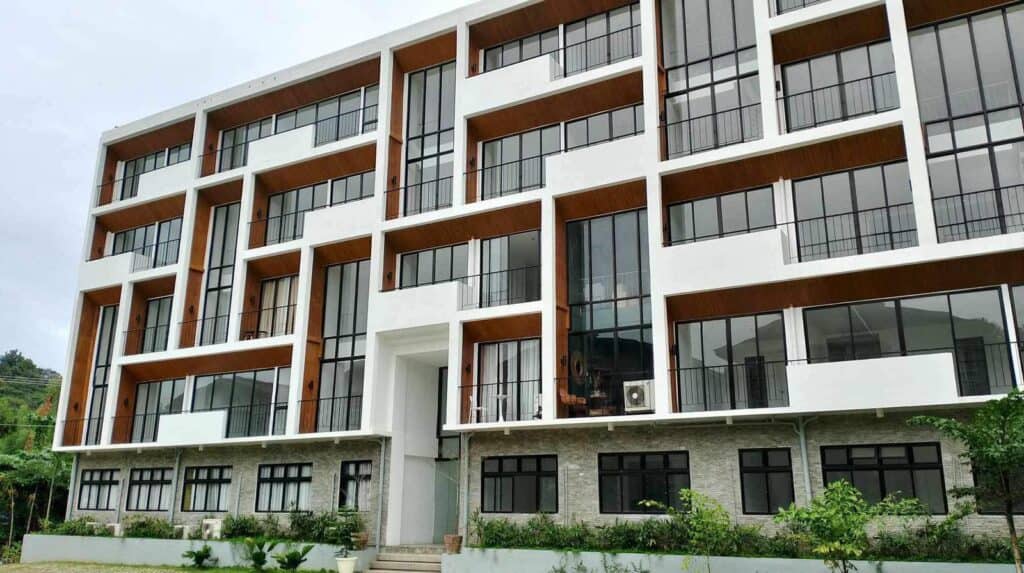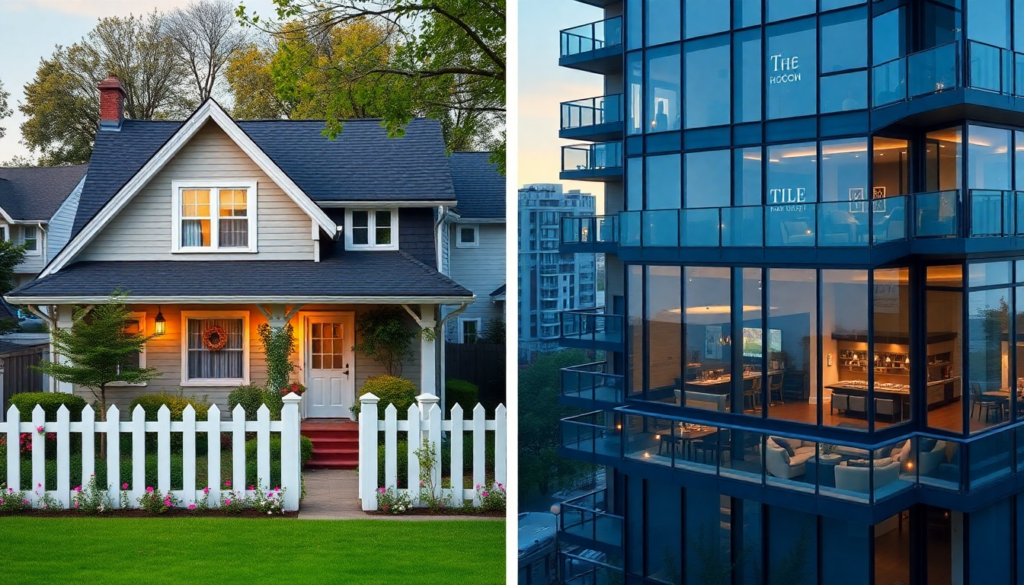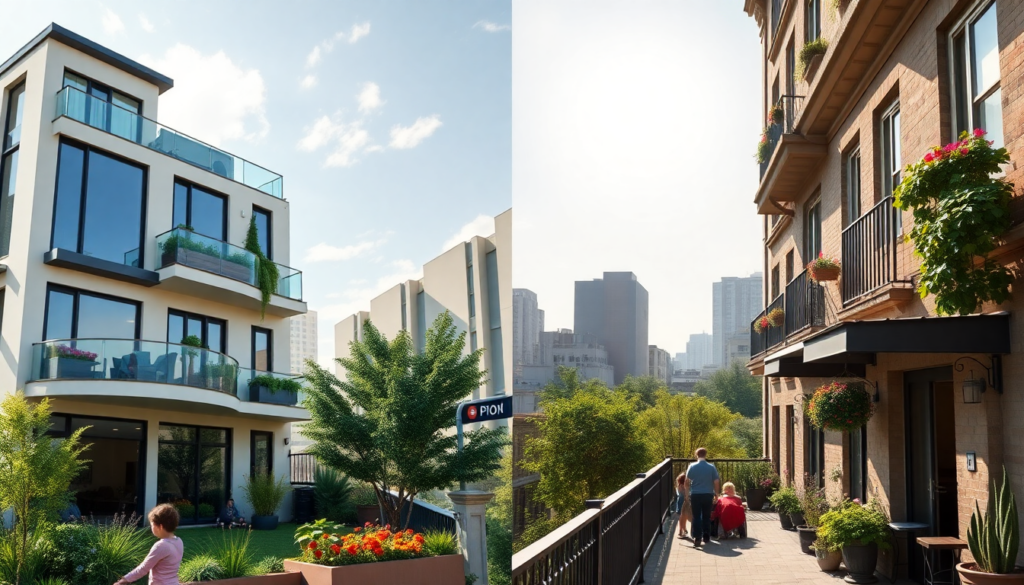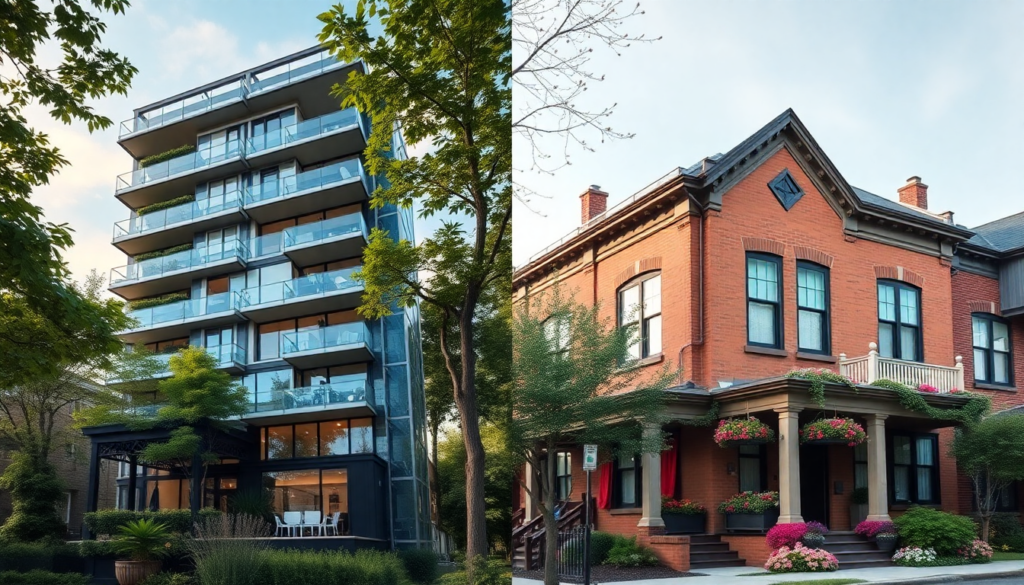Last updated on February 21st, 2025 at 03:19 pm
As urban landscapes evolve and lifestyles shift in response to new economic realities, condos have surged in popularity, capturing the hearts of first-time homebuyers, young professionals, retirees, and even savvy investors. More than just a trend, condo living offers an enticing blend of convenience and community that resonates with diverse demographics. For many, the allure lies in breathtaking city views and easy access to amenities that redefine modern living; for others, it presents an affordable entry point into the housing market amidst soaring prices. But before you dive headfirst into condo ownership—dreaming of rooftop barbecues and strolls through landscaped gardens—it’s crucial to unpack both the advantages and drawbacks.

While the prospect of calling a condo home seems alluring at first glance, it’s essential to engage critically with what this lifestyle truly entails. The shared experiences within a condominium can foster a sense of belonging yet limit privacy in ways that may not accommodate everyone’s preferences. Furthermore, navigating homeowners association (HOA) rules differs vastly from single-family homeownership responsibilities. Therefore, understanding these complexities is vital for making an informed choice that aligns with your unique lifestyle needs and financial considerations. As we delve deeper into this exploration of condo living—its benefits as well as pitfalls—you’ll find insights that will empower you to weigh your options thoughtfully and confidently embark on one of life’s most significant decisions. So let’s dive in: Are condos right for you?

What Is a Condo?
A condominium (or condo for short) is a form of real estate ownership where a specific unit within a larger building or complex is individually owned, while the land and common areas are owned collectively by all the unit owners.
Do you want to learn about the Different Types of Condominiums in the Philippines? (Click the link.)
What Is a Condo Unit?
A condo unit is an individually owned unit within a larger building or complex that shares common areas. Owners pay a fee to cover the costs of maintaining the building and common areas. There are many different types of condo units, including studio units, one-bedroom units, two-bedroom units, and penthouse units.
To learn more about the different types of condominiums in the Philippines, please read this article: What Is a Condo Unit?
Benefits of Condo Living
One of the most enticing aspects of condo living is the impressive array of amenities that many complexes provide. Imagine waking up to a sunlit morning and heading down to a sleek, well-equipped gym for an invigorating workout without ever having to leave your building. From sparkling swimming pools perfect for weekend relaxation to cozy rooftop terraces offering stunning urban views, condos enhance your lifestyle in ways single-family homes often can’t match. These shared facilities not only elevate day-to-day living but also present opportunities to connect with fellow residents, share experiences, and build community relationships.
Beyond luxurious amenities, convenience reigns supreme in condo living thanks to reduced maintenance responsibilities. As a homeowner association (HOA) typically takes charge of routine upkeep tasks such as landscaping, snow removal, and exterior repairs, you’re liberated from the endless chores that characterize traditional homeownership. Picture spending weekends exploring new destinations or unwinding at local cafes instead of hauling heavy bags full of fertilizer or painting fences—this level of freedom resonates strongly with busy professionals and retirees alike who prioritize their time over lawn care.
Safety is another vital feature many prospective condo buyers overlook when considering their options. Many condominiums are equipped with modern security systems like key fob access, surveillance cameras in common areas, and sometimes even 24/7 on-site personnel safeguarding residents’ peace of mind. For young professionals entering city life or retirees seeking an active yet secure environment, these security measures foster feelings of safety and reliability crucial for truly enjoying one’s space. With immediate neighbors nearby and secured entrances acting as barriers against unwanted visitors, condo living presents itself as an attractive solution for anyone wary about their safety in bustling urban settings.
Ultimately, considering the mixture of amenities available, low-maintenance lifestyle benefits, and enhanced security features makes the case for condos particularly compelling for many people today. They provide not just a place to live but a rejuvenated approach towards enjoying life—a lifestyle where leisure takes precedence over labor. For those contemplating if this living arrangement fits their aspirations and needs, it’s clear that very real advantages await in condo communities across the nation.
Check out these condo units—they might be just what you’re looking for! Affordable yet luxurious.
- https://www.nowrealtybrokerage.com/one-garden-residences/
- https://www.nowrealtybrokerage.com/bayanihan-flats/
Click “Message us” to talk to an agent today!

Affordability Considerations
When it comes to making a significant investment like purchasing real estate, affordability often reigns as the primary concern for first-time homebuyers and young professionals alike. Condominiums frequently offer an attractive alternative to single-family homes, especially in urban markets where skyrocketing prices may seem daunting. For instance, consider a recent graduate seeking their first home in a bustling city. By opting for a condo instead of a traditional house, they can find themselves in a prime location—close to work, social activities, and public amenities—without breaking the bank. Many times, these condos come with lower purchase prices compared to standalone homes while still offering ample space and modern features.
Additionally, condos provide a unique advantage through shared costs associated with living expenses. Homeowner Associations (HOAs) typically manage services such as landscaping, maintenance, and even some utility costs—relieving individual owners from the burdens of upkeep that often accompany single-family homes. Imagine residing in a well-managed community where lawn care is taken care of year-round or where plumbing issues are resolved promptly without additional out-of-pocket expenses. By pooling resources together with fellow homeowners, residents can not only save money but also create an environment supporting communal responsibility.
However, it’s vital to understand that while the initial purchase price is appealing, ongoing HOA fees should be factored into your budgeting equation. These fees may vary significantly between different complexes and regions—which requires thorough research on your part before committing to any condo unit. Are you willing to pay higher dues for premium amenities or security that ensures peace of mind? Take time to assess whether these recurring costs align with your lifestyle priorities.
In conclusion, if you’re budget-conscious yet desire proximity to vibrant city life or simpler routines as you step into retirement, exploring condo living could open doors without stretching your finances too thin. Embracing this lifestyle could very well be the stepping stone toward both comfort and financial prudence—a smart choice for today’s discerning buyers!
Check out these condo units—they might be just what you’re looking for! Affordable yet luxurious.
- https://www.nowrealtybrokerage.com/one-garden-residences/
- https://www.nowrealtybrokerage.com/bayanihan-flats/
Click “Message us” to talk to an agent today!

Community Living Experience
One of the most appealing aspects of condo living is the vibrant community experience it fosters. In a world where urban lifestyles can sometimes feel isolating, condos offer numerous opportunities for residents to connect with their neighbors. Whether it’s a casual chat in the hallway or collaborating on common area upkeep, these daily interactions provide a sense of belonging that’s often missing in single-family homes. Imagine returning from work not to an empty driveway but to friendly faces you recognize—how comforting that can be!
Moreover, many condos take community engagement to another level by organizing events that encourage resident participation. From summer barbecues and holiday parties to movie nights and fitness classes, these gatherings create memorable moments while fostering camaraderie among residents. Picture yourself attending a roof-top happy hour with fellow condo dwellers after a long week; sharing stories while overlooking the city skyline can transform strangers into friends. This active social scene not only enhances your lifestyle but also enriches your overall well-being, as strong social ties have been linked to healthier life outcomes.
However, it’s important to consider that this community living experience is not universal and may vary significantly depending on the building’s culture and management. Some complexes might boast highly engaged communities with vibrant event calendars, while others could feel more standoffish or lack cohesion among residents. It’s imperative for potential buyers to visit different complexes and assess what kinds of social opportunities exist before making a commitment. Such diligence ensures you will choose an environment that aligns with your personal values and desires for interaction.
Ultimately, the communal aspect of condo life serves as both a benefit and a vital consideration for prospective buyers. If you’re someone who thrives in social settings and seeks engagement within your living space, then recounting tales over wine at neighborhood potlucks may soon become your new norm—not just an occasional luxury! For those craving connection amidst the solitude offered by modern urban living, selecting a condo with an exciting community atmosphere could truly elevate your residential experience above mere convenience.
Potential Drawbacks
While the charm of condo living is undeniable, it’s essential to approach this lifestyle with a clear understanding of its potential drawbacks. One significant concern for many prospective homeowners is limited privacy. Sharing walls and common areas with neighbors can lead to feelings of confinement, particularly for those used to the more spacious quarters of a single-family home. Imagine hosting a quiet dinner party only to be interrupted by laughter or music filtering through the adjoining wall. This lack of buffer space can be disconcerting for individuals craving solitude, especially young professionals or retirees looking for a serene sanctuary.
Moreover, noise concerns in condo living are often intertwined with privacy issues. Factors like shared hallways and communal spaces mean that everyday sounds can quickly escalate into disturbances—think heavy footsteps overhead or doors slamming at odd hours disrupting your peaceful evening routine. For urban dwellers accustomed to city sounds, this may seem trivial; however, it can become an annoyance over time. If you’re sensitive to noise or value quiet time after long days at work, carefully considering the acoustics and layout when choosing a condo is crucial.
Check out these condo units—they might be just what you’re looking for! Affordable yet luxurious.
- https://www.nowrealtybrokerage.com/one-garden-residences/
- https://www.nowrealtybrokerage.com/bayanihan-flats/
Click “Message us” to talk to an agent today!

Understanding Homeowner Associations (HOAs)
Another aspect that warrants attention is the role of Homeowner Associations (HOAs) in managing condos. These governing bodies play a pivotal part in defining day-to-day life within condo communities through their rules and regulations. From pet policies to exterior modifications and even rental restrictions, HOAs set guidelines that all residents must follow—creating harmony among diverse lifestyles but potentially stifling individuality as well. Consider someone who wants the freedom to paint their door a vibrant shade; they may face pushback from HOA standards mandating uniformity.
However, while these regulations help maintain property values and promote community aesthetics, they come hand-in-hand with fees that impact your overall budget significantly. Regular assessments contribute towards maintaining amenities like pools or gyms but are an additional cost that first-time buyers must account for when evaluating affordability. Not all HOAs operate transparently either; unexpected special assessments can arise—such as emergency repairs—that might catch residents off guard financially. Thus, being diligent about reviewing HOA bylaws thoroughly before committing could save you both money and headaches down the road!
Location Advantages
One of the most compelling reasons to consider condo living is the significant advantage of urban accessibility. Condominiums are often strategically located in vibrant neighborhoods that offer easy access to essential amenities such as workplaces, entertainment options, and public transportation systems. Imagine being able to take a quick stroll from your home to a nearby coffee shop or hop on a subway within minutes to reach your office downtown—all without the hassle of long commutes. For busy professionals and urban dwellers alike, these conveniences can drastically enhance the quality of daily life, making it easier to balance work, leisure, and personal well-being.
Moreover, the lifestyle alignment that condos provide is particularly attractive for today’s diverse range of buyers—from young professionals seeking dynamic environments to retirees looking for low-maintenance living. Condos can cater to an array of lifestyles; if you thrive in bustling urban centers filled with art galleries, theaters, and restaurants, choosing a condo in such a location can enrich your social life immensely. Alternatively, if you’re considering retirement and prefer quieter settings but still want proximity to essential services and recreational activities like parks or community clubs—there’s likely a condo development tailored just for that need.
Additionally, many condos come equipped with features that support an active lifestyle by promoting physical health and wellness right at home. Facilities like gyms, swimming pools, or rooftop terraces create opportunities for residents not only to stay fit but also to socialize without needing extensive travel or membership costs elsewhere. The option of enjoying sunsets from communal spaces adds another dimension resulting in a sense of connection among residents while maintaining privacy and personal space when needed.
Ultimately, when weighing the pros and cons of condominium living against your individual needs—whether it’s convenience during busy workweeks or cultivating social connections—the location advantages become crucial focal points in making an informed decision. Evaluate how seamlessly you’ll be able to integrate these benefits into your routine; understanding how they align with both your professional aspirations and personal desires will empower you to choose wisely—and perhaps even spark excitement about this new chapter in your life!
Market Trends for Condos
As urban living continues to rise in desirability, the demand for condos has surged in various locations across the country. Cities like Miami, Austin, and Seattle have seen a significant uptick in condo developments catering to young professionals, retirees, and even remote workers seeking a vibrant lifestyle with minimal upkeep. The convenience of urban centers coupled with the amenities offered by condominiums makes them an appealing option for many. Real estate experts note that in metropolitan areas where housing supply is consistently low, condos stand out as viable alternatives. For first-time homebuyers, this presents both opportunities and challenges as they navigate a competitive market.
When analyzing investment potential, condos can offer remarkable prospects that differ from traditional single-family homes. Notably, condo prices often reflect lower entry points into sought-after neighborhoods or city cores—making them attractive options for real estate investors looking to capitalize on growing markets. Moreover, by purchasing a condo in a desirable location with strong rental yields, owners open themselves up to lucrative short-term rental possibilities, especially in tourist-heavy cities or regions undergoing revitalization. This stands in stark contrast to traditional housing markets where properties might require larger outlays yet yield slower growth due to factors such as maintenance costs and local zoning regulations.
However, while the investment appeal is clear—especially given ongoing trends toward urbanization—prospective buyers and investors alike must perform thorough research before diving headfirst into condo ownership. It’s essential to consider aspects such as homeowner association (HOA) fees which can vary widely based on the property’s amenities and services offered. Additionally, the fluctuating nature of condo resale values compared to single-family homes cautions against blind optimism; understanding local market dynamics will better equip buyers to make informed decisions going forward.
In conclusion, as demand for condos remains buoyant across diverse urban locales paired with their appealing investment potential, prospective buyers should weigh these market trends carefully against their personal goals and financial capabilities. This approach ensures that whether you’re looking for your first home or planning your next investment venture, you embark on a path aligned with both current market conditions and your future aspirations.
Check out these condo units—they might be just what you’re looking for! Affordable yet luxurious.
- https://www.nowrealtybrokerage.com/one-garden-residences/
- https://www.nowrealtybrokerage.com/bayanihan-flats/
Click “Message us” to talk to an agent today!

House or Condo: Which is Right for You?

Ready to buy your own home? Choosing between a house and a condo is a big decision. Many people opt for a condo over a traditional house, so let’s look at the pros and cons to help you decide.
Price: Condos are generally less expensive than houses. This is because condo units tend to be smaller, and the price doesn’t include the land. This makes them more affordable, especially for first-time homebuyers.
Who are they for? Besides first-time homeowners, condos are also popular with retirees as condo communities often offer services tailored to their needs. Imagine the peace of mind that brings.
Amenities: Condos typically offer amenities that you might not easily find in a regular house, such as a swimming pool, function hall, gym, or even a children’s play area. It’s like resort-style living!
Maintenance: If you don’t want a lot of home maintenance work, a condo is perfect. You don’t have to worry about mowing the lawn or fixing the roof. The condo management takes care of that! Plus, because maintenance expenses are shared, you’ll save money.
But wait, before you decide… There are also things you should consider. For example, in a condo, your space is smaller compared to a house. So, if you have a large family, a house might be better. You also need to pay monthly association dues for maintenance and amenities. And of course, you have more limited control over modifications to your unit compared to a house.
So, which is right for you? Carefully consider your lifestyle, budget, and needs before you decide. If you need more space and want your own land, a house is for you. But if you want a more affordable option, less maintenance, and convenient access to amenities, a condo is the perfect choice.
For more information: Research the available options in your area. Talk to real estate agents, brokers, or realtors to better understand the pros and cons of each. And most importantly, choose the property that will give you a comfortable and peaceful life.
Condo vs. Apartment: What’s the Difference?

Condos and apartments often look similar – units within a larger building – but they’re fundamentally different, primarily in terms of ownership and control. Understanding this key distinction is crucial when deciding where to live.
Ownership: This is the biggest difference. When you buy a condo, you own the unit outright. Think of it like owning a house, but within a multi-unit building. With an apartment, you’re essentially renting from a landlord who owns the entire building (or at least your unit).
Control and Modifications: As a condo owner, you have much more freedom to personalize your space. You can renovate the kitchen, update the bathroom, change the flooring, or repaint the walls – pretty much anything within your unit’s boundaries, as long as it adheres to the Homeowners Association (HOA) rules and doesn’t affect other units (you can’t, for example, expand your condo into a neighboring unit). In an apartment, your control is limited. You might be allowed to paint, but major renovations are usually off-limits. The landlord calls the shots.
Financial Implications: With a condo, you’re responsible for your mortgage, property taxes, and HOA fees. While these fees can cover some building maintenance and amenities, you’re also building equity in your property. In an apartment, you pay rent, and the landlord covers property taxes and building maintenance. However, rent can increase when your lease expires, and you’re not building equity. A fixed-rate mortgage on a condo, on the other hand, provides predictable monthly payments.
Lifestyle: Both condos and apartments offer a sense of community, shared spaces (sometimes), and often desirable locations. If you enjoy apartment living but want the benefits of ownership and building equity, a condo could be a great option. It combines the convenience of apartment living with the long-term financial advantages of homeownership.
Condo vs. Townhouse: What’s the Difference?

While both condos and townhouses are popular housing options, especially for first-time buyers, they’re not the same. They share some similarities – both are typically owned, not rented, and often attached to other units – but there are key distinctions.
Similarities: Both condos and townhouses offer a middle ground between apartment living and a detached single-family home. They often appeal to those seeking homeownership without the upkeep of a large property.
Key Differences:
- Structure: A condo is a unit within a larger multi-unit building, similar to an apartment but owned, not rented. Think of a high-rise or a low-rise building where each unit is individually owned. A townhouse, on the other hand, is a multi-level dwelling, often with its own private entrance and sometimes a small yard. They are typically attached to other townhouses in a row or cluster.
- Ownership: With a condo, you own the individual unit, but the building and common areas are owned and managed by a Homeowners Association (HOA). With a townhouse, you typically own both the interior and exterior of your unit, including the land it sits on. However, there might still be an HOA governing shared amenities or common areas.
- Size and Layout: Townhouses are generally larger than condos and offer more living space, often spread across multiple floors. They tend to feel more like a traditional house, just attached to neighboring units. Condos, while varying in size, are usually smaller and contained within a single level.
- Privacy: Townhouses often offer more privacy than condos, as they typically have their own entrances and sometimes small yards or patios. Condos, being within a larger building, may offer less privacy.
Think of it this way: A condo is like owning an apartment. A townhouse is like owning a small, attached house.
Popularity: Both condos and townhouses are popular choices, especially in urban areas where land is scarce and detached houses are expensive. Their prevalence often depends on the specific location and its demographics.
In short: If you want a smaller, more manageable space with shared amenities, a condo might be a good fit. If you prefer more space, privacy, and a more “house-like” feel, a townhouse could be the better choice.
Making Your Decision
When considering whether a condo is the right choice for you, it’s essential to evaluate your lifestyle needs in conjunction with the benefits and drawbacks we’ve discussed. Are you someone who values community interaction, or do you prize solitude and privacy? Reflect on your daily routine: if you thrive in a bustling urban environment filled with energetic social gatherings, then the communal aspects of condo life may enrich your overall experience. On the other hand, if peace is paramount for your mental well-being, shared walls and common spaces could pose challenges.
Financial considerations play a vital role in this decision-making process as well. While condos often present lower purchase prices compared to single-family homes—making them appealing particularly to first-time homebuyers—the reality of homeowner association (HOA) fees must not be overlooked. These monthly charges can vary widely based on amenities offered and location; therefore, budgeting becomes critical. For instance, while an attractive downtown condo might come with a stunning rooftop pool and fitness center that enhance your lifestyle, its associated costs can quickly add up. It would be wise to ask yourself: are these amenities worth the additional expense when compared to maintaining a standalone property where you have complete control over costs?
Moreover, consider long-term financial implications such as property appreciation potential versus ongoing expenses like maintenance assessments or unexpected repairs from HOA mishaps. Engaging with current market trends is also crucial; research whether surrounding properties appreciate more rapidly than condos in your area of interest. This knowledge gives clarity about potential investment returns down the line—a fundamental factor, especially for real estate investors contemplating their next move.
Ultimately, making an informed decision hinges upon aligning your values with practical realities. Take time to weigh what lifestyle elements matter most against the financial responsibilities you’re prepared to undertake. Whether it’s analyzing proximity to work or weighing important factors like affordability and community engagement, taking comprehensive stock now will lead you toward a living arrangement that feels exactly right for both today and tomorrow.
Assessing Your Condo Choice: A Thoughtful Decision
In considering whether condo living aligns with your lifestyle and financial aspirations, it is crucial to reflect on the key advantages and potential drawbacks discussed throughout this article. The allure of amenities, reduced maintenance responsibilities, and community engagement are compelling for many first-time homebuyers and urban dwellers. However, it’s equally important to acknowledge the possible compromises in privacy, noise levels, and the obligations that come with homeowner associations. This multifaceted decision requires you to weigh personal preferences against practical realities.
As you stand at this crossroads, take a moment to truly assess what matters most to you. Are you after vibrant social experiences or do you prioritize quiet moments of solitude? Evaluate your budget carefully—will condo fees fit comfortably within your financial plans? Remember that every choice carries inherent benefits and challenges; thus, only you can define what “home” means in your context. By reflecting deeply on these factors and prioritizing what resonates with your values and lifestyle needs, you’ll be well-equipped to make an informed decision that leads you toward a fulfilling living experience.
Check out these condo units—they might be just what you’re looking for! Affordable yet luxurious.
- https://www.nowrealtybrokerage.com/one-garden-residences/
- https://www.nowrealtybrokerage.com/bayanihan-flats/
Click “Message us” to talk to an agent today!

